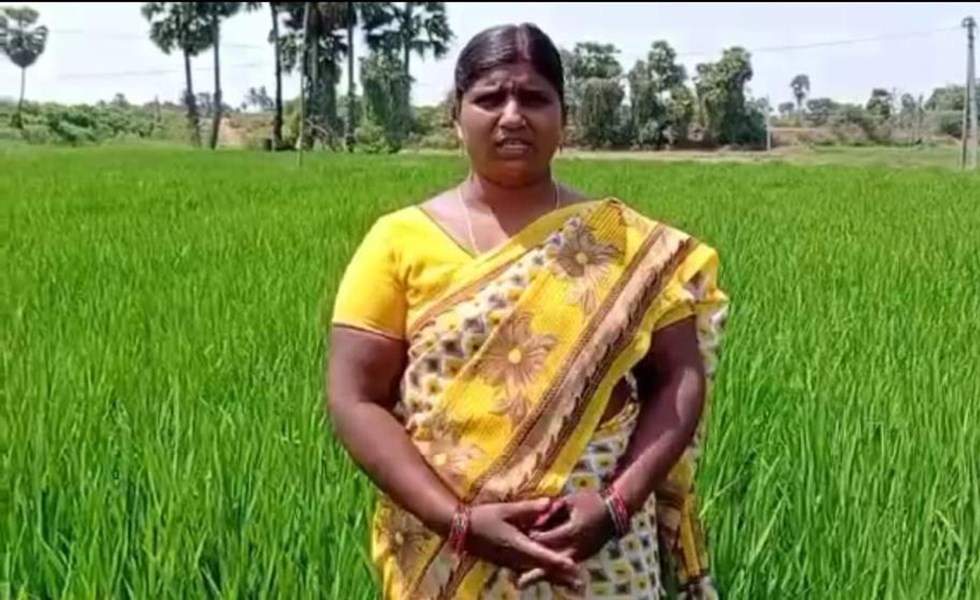Successful fight by union for compensation after failed harvest
After a tempting picture painted by the representative from a large seed company, Gundru - a farmer in India - made the decision to switch over to seed production. Many farmers were burdened by heavy debts and the promises by the seed company augured well. But Gundru, and with her many other farmers, had been misled. But luckily the agricultural workers’ union APVVU, a partner of Mondiaal FNV, was there at hand.

Gundru
In the village of Janardhanavaram in the federal state of Andhra Pradesh in the south of India, small and marginal farmers farm small plots of agricultural land. They grow a variety of crops, and they also work as agricultural labourers when there isn’t enough work on their own land. Many farmers are burdened by heavy debts because the investments involved in agricultural production are increasing all the time: tractor hire and purchase of seeds and fertiliser are beyond their reach unless they take on private loans, over and above bank loans, at interest rates rising to 36%.
Huge promises by seed company
Gundru heard from fellow farmers that they were planning to plant industrial seed, as this was lucrative and they were all feeling the pressure since the arrival of corona. At a union meeting in the village, a representative from TATA Company told them all about paddy seed cultivation. Paddy is a type of rice. Gundru: “He said that the company would donate seeds and fertilisers and would provide support and guidance at all stages to ensure optimal crop growth. He also said that the yield would be more than it would normally be, up to 60 quintals (6,000 kilos) and that the company would buy back the crop for a higher price. So, we agreed to this and asked him about a crop guarantee. He said there would be compensation if the crop failed.”
Huge investments but a poor harvest
Gundru and her husband decided to grow paddy seed from TATA Company on the whole of their two hectares. The company provided them with seeds and fertilisers as well as with enough pesticides for two hectares. They themselves invested in ploughs, seed plants, wages, etc. For whole three months, they grew the crops, with advice from the representative. But what emerged, after the harvest, was that the crop yield was no more than 20 quintals per acre instead of the picture painted of 60. All the farmers in their village and in three other villages besides had the same experience. According to the representative, the crop failure was entirely the fault of the farmers themselves: they had supposedly not carried out the pollination correctly and had not irrigated sufficiently. Yet the farmers had followed all the advice given by the representative. They requested that he resolve the issue with TATA Company.
Trade union comes to their aid
Fortunately, trade union APVVU is active in this region in organising farm workers and small and marginal farmers. The union organised the farmers and facilitated actions and negotiations. This began with a fact-finding investigation and the collecting of evidence. What emerged was that a total of 542 acres of land had had a poor harvest. Notwithstanding this, the company continued to refuse compensation for the losses.
Compensation paid after effective social dialogue
Following these fact-finding missions, the workers took various kinds of action, with support from the union. In some villages, the negotiations went more smoothly than in others. In Janardhanavaram, the social dialogue was effective. All the farmers involved organised a village-level meeting with the trade union leaders of that district, where the matter was discussed and the decision made to demand compensation, exactly as promised by the representative. There followed a calculation, and the farmers decided to claim 100,000 rupees per hectare and to deliver to the company all the seeds produced. Following intensive discussion, a compromise of 45,000 rupees per acre was reached plus a hundred rupees from the representative.
63 Village heads convinced
In the other three villages, it was more difficult to reach agreement. APVVU held a public hearing and invited officials from the Departments Of Agriculture and of Labour & Employment, as well as companies and seed representatives, and other trade unions and the media. During these hearings, 63 village heads were persuaded into adopting resolutions in support of the farmers. Whenever resolutions are adopted, the government is required to intervene in the matter. This compelled government officials to get round the table with the companies.
Companies paid up. Union gained a whole lot more members
In spite of the lockdown, the negotiations were rounded off successfully and in the end the companies paid up. Up to now, nearly 28 million rupees has been paid out, which is 92% of the total amount agreed on. This first success story of collective interventions increased the visibility of the APVVU in the area, which led to a membership growth of 6,470 in 2021.